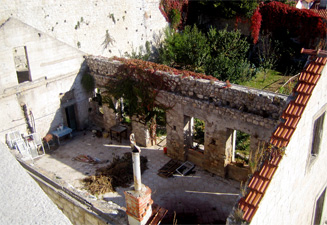Displaced: A Bosnian's Story
By Carmina Osuna
Upon her return to Bosnia,
Lana (23), came to discover that what she once thought of as home had
been
taken over by a judge.
A town in Bosnia
12 hours away from Croatia
was where her home was. Lana remembers
that most Catholics who lived in Bosnia
moved to Croatia. There were about 13,000 people who made it to Norway
from Bosnia. Most of these were families and couples who
had inter-marriages households where the parents were raised practicing
different religions or non at all. 
My
family
and I stayed in Norway
after the second war. There were two wars really, the first between Serbia
and the Croats who believed they were performing ethnic cleansing the
second was
the Muslims against the Croats. This
took place between April 6 1992
and November 1995. My family and I
however,
came back to Bosnia
in 1998. Many of the displaced families
came back to find that their homes had been taken over by other
families whose
homes were also inhabited by strangers. We
left everything behind and our memories were thrown away, I guess. My family like many others had to go to court
and prove that the home we claimed as our own was actually ours. The rule was that people had to have two
documents of ownership. The guy staying
at our house was the judge that was to decide our case.
Luckily for us, he voluntarily moved out to
another of his three houses. Others who
were able to move back into their home were now in a neighborhood
dominated by
a different culture of people. For a
Serbian who was in a predominant Muslim neighborhood would switch homes
with a
Muslim in a predominantly Serbian community.
Even with some people finding
a comfortable
place to live there are many more that have yet to find their niche. Lana says that the displacement of people has
been such a big problem to the point that there hasn’t been a census
since 1991,
when people began to move back to their homelands.
Lana is
currently living and studying general law in Bosnia. She also recognizes what I recall learning
about India youth and education, “the brain drain,” the out-migration
of
educated professionals from Croatia and Bosnia. Lana
says that she doesn’t understand why
students leave after getting a practically free education.
Lana says that Bosnia
needs a lot of work and that she plans to be part of the solution.
The
in-class
reading, “People
Displaced,” includes interviews of displaced people from Croatia. The interviews tell the stories in a similar
way as I did above. Regardless of why
wars are fought it always affects both sides especially in a war where
the land
borders are close to non-existent. The
Croatian and Bosnian experiences are similar in the sense that there
were
displaced people from both sides. Wars
undoubtedly
affect people and the migration to or form the countries involved. Many people move because of the military
draft or because they simply don’t agree with the politics and don’t
see any
other solution. In Lana’s family’s case,
as in the case of many others, they had no other choice but to move for
their
own safety.
|

